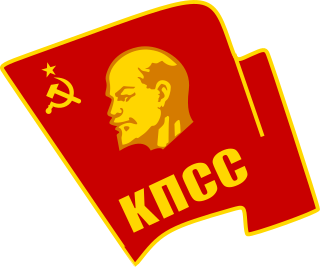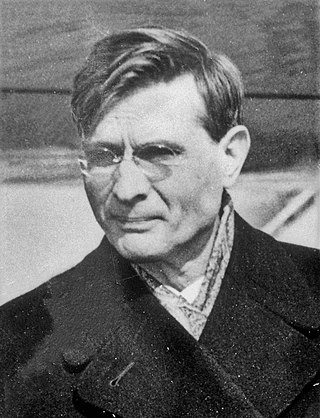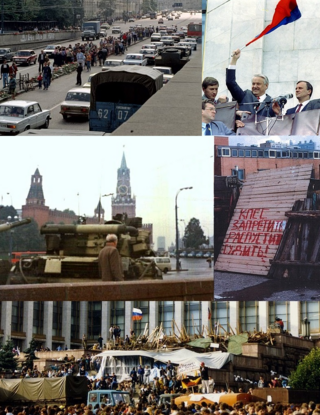
The 19th All-Union Conference of the Communist Party of the Soviet Union was a party conference held by the Communist Party of the Soviet Union from 28 June to 1 July 1988. [1] The conference was attended by 4,991 delegates. [2]

The 19th All-Union Conference of the Communist Party of the Soviet Union was a party conference held by the Communist Party of the Soviet Union from 28 June to 1 July 1988. [1] The conference was attended by 4,991 delegates. [2]
The General Secretary, Mikhail Gorbachev, declared in his opening speech that political reform was the key issue. [2] [3] Gorbachev wanted to achieve the "democratization of the life of the state and society", and wanted the Soviet Union to "move along the path of the creation of a socialist state under the rule of law". [4]
The Conference called for elections for the governmental soviets at all levels, with secret ballots and multiple candidacies, and it established the Congress of People's Deputies of the Soviet Union. [2]
Although Gorbachev had to compromise on some of his several objectives because of conservative resistance, the conference was a significant victory for Gorbachev. [2]

The Brezhnev Doctrine was a Soviet foreign policy that proclaimed that any threat to "socialist rule" in any state of the Soviet Bloc in Central and Eastern Europe was a threat to all of them, and therefore, it justified the intervention of fellow socialist states. It was proclaimed in order to justify the Soviet-led occupation of Czechoslovakia earlier in 1968, with the overthrow of the reformist government there. The references to "socialism" meant control by the communist parties which were loyal to the Kremlin. Soviet leader Mikhail Gorbachev repudiated the doctrine in the late 1980s, as the Kremlin accepted the peaceful overthrow of Soviet rule in all its satellite countries in Eastern Europe.

The Communist Party of the Soviet Union (CPSU), at some points known as the Russian Communist Party (Bolsheviks) and All-Union Communist Party (Bolsheviks) and sometimes referred to as the Soviet Communist Party (SCP), was the founding and ruling political party of the Soviet Union. The CPSU was the sole governing party of the Soviet Union until 1990 when the Congress of People's Deputies modified Article 6 of the 1977 Soviet Constitution, which had previously granted the CPSU a monopoly over the political system.

The history of the Soviet Union from 1982 through 1991 spans the period from the Soviet leader Leonid Brezhnev's death until the dissolution of the Soviet Union. Due to the years of Soviet military buildup at the expense of domestic development, and complex systemic problems in the command economy, Soviet output stagnated. Failed attempts at reform, a standstill economy, and the success of the proxies of the United States against the Soviet Union's forces in the war in Afghanistan led to a general feeling of discontent, especially in the Soviet-occupied Baltic countries and Eastern Europe.
Glasnost is a concept relating to openness and transparency. It has several general and specific meanings, including a policy of maximum openness in the activities of state institutions and freedom of information and the inadmissibility of hushing up problems. In Russian the word 'гласность' has long been used to mean "openness" and "transparency". In the mid-1980s, it was popularised by Mikhail Gorbachev as a political slogan for increased government transparency in the Soviet Union within the framework of perestroika, and the calque of the word entered into English in the latter meaning.

Mikhail Sergeyevich Gorbachev was a Soviet and Russian politician who served as the eighth and final leader of the Soviet Union from 1985 to the country's dissolution in 1991. He served as General Secretary of the Communist Party of the Soviet Union from 1985 and additionally as head of state beginning in 1988, as Chairman of the Presidium of the Supreme Soviet from 1988 to 1989, Chairman of the Supreme Soviet from 1989 to 1990 and the only President of the Soviet Union from 1990 to 1991. Ideologically, Gorbachev initially adhered to Marxism–Leninism but moved towards social democracy by the early 1990s.

Perestroika was a political reform movement within the Communist Party of the Soviet Union (CPSU) during the late 1980s widely associated with CPSU general secretary Mikhail Gorbachev and his glasnost policy reform. The literal meaning of perestroika is "restructuring", referring to the restructuring of the political and economic systems of the Soviet Union, in an attempt to end the Era of Stagnation.

The Soviet Union, officially the Union of Soviet Socialist Republics (USSR), was a transcontinental country that spanned much of Eurasia from 1922 to 1991. A flagship communist state, it was nominally a federal union of fifteen national republics; in practice, both its government and its economy were highly centralized until its final years. It was a one-party state governed by the Communist Party of the Soviet Union, with the city of Moscow serving as its capital as well as that of its largest and most populous republic: the Russian SFSR. Other major cities included Leningrad, Kiev, Minsk, Tashkent, Alma-Ata, and Novosibirsk. It was the largest country in the world, covering over 22,402,200 square kilometres (8,649,500 sq mi) and spanning eleven time zones.

Leonid Ilyich Brezhnev was a Soviet politician who served as General Secretary of the Communist Party of the Soviet Union from 1964 until his death in 1982, and Chairman of the Presidium of the Supreme Soviet from 1960 to 1964 and again from 1977 to 1982. His 18-year term as General Secretary was second only to Joseph Stalin's in duration. To this day, the quality of Brezhnev's tenure as General Secretary remains debated by historians. While his rule was characterized by political stability and significant foreign policy successes, it was also marked by corruption, inefficiency, economic stagnation, and rapidly growing technological gaps with the West.

The Cold War was a period of geopolitical tension between the United States and the Soviet Union and their respective allies, the Western Bloc and the Eastern Bloc. The term cold war is used because there was no large-scale fighting directly between the two superpowers, but they each supported opposing sides in major regional conflicts known as proxy wars. The conflict was based on the ideological and geopolitical struggle for global influence by these two superpowers, following their roles as the Allies of World War II that led to victory against Nazi Germany and Imperial Japan in 1945. Aside from the nuclear arms race and conventional military deployment, the struggle for dominance was expressed via indirect means, such as psychological warfare, propaganda campaigns, espionage, far-reaching embargoes, sports diplomacy, and technological competitions like the Space Race.

Andrei Andreyevich Gromyko was a Soviet politician and diplomat during the Cold War. He served as Minister of Foreign Affairs (1957–1985) and as Chairman of the Presidium of the Supreme Soviet (1985–1988). Gromyko was responsible for many top decisions on Soviet foreign policy until he retired in 1988. In the 1940s Western pundits called him Mr Nyet or "Grim Grom", because of his frequent use of the Soviet veto in the United Nations Security Council.

Mikhail Andreyevich Suslov was a Soviet statesman during the Cold War. He served as Second Secretary of the Communist Party of the Soviet Union from 1965, and as unofficial chief ideologue of the party until his death in 1982. Suslov was responsible for party democracy and power separation within the Communist Party. His hardline attitude resisting change made him one of the foremost orthodox communist Soviet leaders.

The 1991 Soviet coup d'état attempt, also known as the August Coup, was a failed attempt by hardliners of the Soviet Union's Communist Party to forcibly seize control of the country from Mikhail Gorbachev, who was Soviet President and General Secretary of the Communist Party at the time. The coup leaders consisted of top military and civilian officials, including Vice President Gennady Yanayev, who together formed the State Committee on the State of Emergency (GKChP). They opposed Gorbachev's reform program, were angry at the loss of control over Eastern European states and fearful of the USSR's New Union Treaty which was on the verge of being signed. The treaty was to decentralize much of the central Soviet government's power and distribute it among its fifteen republics.

The time period of around 1985–1991 marked the final period of the Cold War. It was characterized by systemic reform within the Soviet Union, the easing of geopolitical tensions between the Soviet-led bloc and the United States-led bloc, the collapse of the Soviet Union's influence in Eastern Europe, and the dissolution of the Soviet Union in 1991.

Before the perestroika Soviet era reforms of Gorbachev that promoted Eurocommunism, the majority of its history it went the formal ideology of the Communist Party of the Soviet Union (CPSU) was Marxism–Leninism, a form of socialism consisting of a centralised command economy with a vanguardist one-party state that aimed to realize the dictatorship of the proletariat. The Soviet Union's ideological commitment to achieving communism included the national communist development of socialism in one country and peaceful coexistence with capitalist countries while engaging in anti-imperialism to defend the international proletariat, combat the predominant prevailing global system of capitalism and promote the goals of Russian Communism. The state ideology of the Soviet Union—and thus Marxism–Leninism—derived and developed from the theories, policies and political praxis of Marx, Lenin and Stalin.

The Congress of People's Deputies of the Soviet Union was the highest body of state authority of the Soviet Union from 1989 to 1991.

The Chicken Kiev speech is the nickname for a speech given by the United States president George H. W. Bush in Kiev, Ukraine, on August 1, 1991, three weeks before the Declaration of Independence of Ukraine and four months before the December independence referendum in which 92.26% of Ukrainians voted to withdraw from the Soviet Union. The Soviet Union collapsed 145 days after the speech, partially pushed by Ukraine. The address, in which Bush cautioned against "suicidal nationalism", was written by Condoleezza Rice—later Secretary of State under President George W. Bush—when she was in charge of Soviet and Eastern European affairs for the first President Bush. It outraged Ukrainian nationalists and American conservatives, with the conservative New York Times columnist William Safire calling it the "Chicken Kiev speech", named after a dish of stuffed chicken breast, in protest at what he saw as its "colossal misjudgment", weak tone and miscalculation.

The history of Soviet Russia and the Soviet Union (USSR) reflects a period of change for both Russia and the world. Though the terms "Soviet Russia" and "Soviet Union" often are synonymous in everyday speech, when referring to the foundations of the Soviet Union, "Soviet Russia" often specifically refers to brief period between the October Revolution of 1917 and the creation of the Soviet Union in 1922.

The dissolution of the Soviet Union was the process of internal disintegration within the Soviet Union (USSR), which resulted in the end of the country as a sovereign state and its federal government, which in turn resulted in its 15 constituent republics gaining full independence on 26 December 1991. It brought an end to General Secretary Mikhail Gorbachev's effort to reform the Soviet political and economic system in an attempt to stop a period of political stalemate and economic backslide. The Soviet Union had experienced internal stagnation and ethnic separatism. Although highly centralized until its final years, the country was made up of 15 top-level republics that served as homelands for different ethnicities. By late 1991, amid a catastrophic political crisis, with several republics already departing the Union and the waning of centralized power, the leaders of three of its founding members declared that the Soviet Union no longer existed. Eight more republics joined their declaration shortly thereafter. Gorbachev resigned in December 1991 and what was left of the Soviet parliament voted to end itself.
The four-day Sino-Soviet Summit was held in Beijing from 15-18 May 1989. This would be the first formal meeting between a Soviet Communist leader and a Chinese Communist leader since the Sino-Soviet split in the 1950s. The last Soviet leader to visit China was Nikita Khrushchev in September 1959. Both Deng Xiaoping, the paramount leader of China, and Mikhail Gorbachev, General Secretary of the Communist Party of the Soviet Union, proclaimed that the summit was the beginning of normalized state-to-state relations. The meeting between Mikhail Gorbachev and then General Secretary of the Chinese Communist Party (CCP), Zhao Ziyang, was hailed as the "natural restoration" of party-to-party relations.